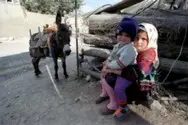| Freelang dictionary |
| Other Freelang resources |
| Sponsored Links |
Freelang Udi-English dictionary
| Related dictionaries |
| Udi is closely related to Tabassaran, Lezgi and Aghul, with which it forms the Eastern Samur sub-group of the Lezgic languages. |
| Live from the Blog |
|
Udi – The oldest language in Dagestan It is believed that the Udi language was the main language that was spoken in the region that stretched from Dagestan to Azerbaijan. Udi is a North-East Caucasian language. It is thought that the earlier version of Udi was Caucasian Albania. Udi speakers can be found in Azerbaijan, Armenia, Russia and Georgia. Approximately 5,000 people speak this language. Udi has been classified as an endangered language by UNESCO in the World Atlas of Languages. Most Udi speakers are either [...] |
![]()
Udi is a Northeast Caucasian language of Azerbaijan. It has about 5,000 speakers.
Features of this dictionary
Download our free dictionary (for Windows or Android) and browse both the Udi-English and the English-Udi lists. Look up a word, add or modify an entry, and learn words at your own rhythm from a personal learning list. Click here to learn more about the features or scroll down to download the program. An online version is also available, so you can browse the dictionary without downloading it.
Features of this dictionary
Download our free dictionary for Android! Browse the wordlists, look up words and practice your vocabulary at your own rhythm. An online version is also available, so you can browse the dictionary without downloading it.
Word list information
This dictionary was made by Renato B. Figueiredo.
List status: © Renato B. Figueiredo
Udi > English: 500 words
English > Udi: 440 words
Last update: March 21, 2014
First upload: June 8, 2009
Download
1. Read and accept the terms of our copyright notice
2. Click here to download the program (2.21 mb)
3. Click here to download the Udi word list (320.02 kb)
4. Double click on each file and install in suggested folder.
Other Freelang resources
We have more than dictionaries and translation! Check out our collection of common expressions translated in all languages, test your knowledge with our quizzes about languages, or learn more about language families. To stay in touch with us, read our blog about languages and follow us on Facebook.






